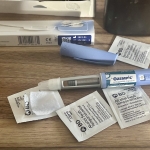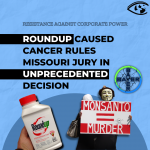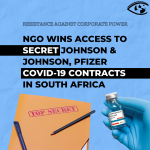Silence = Death: AIDS, Africa and Pharmaceuticals
The West is willfully turning its back on the greatest human tragedy of our age, says the former deputy head of Unicef.
Last October, I sat in on a Grade 5 "life skills" class at the David Livingstone Elementary School in Harare, Zimbabwe. There were 41 of the most eager, verbal, bright, downright adorable 10-year-olds I had seen in a very long time. Life skills classes, held once a week, give teachers the opportunity to deal with the HIV/AIDS pandemic raging through the country,indicative, as it is, of what's happening throughout Southern Africa.
"I want to know what you worry about," said the teacher. "I want each of you to write down your greatest worry on a piece of paper, and then I'll gather them all up, put them in this box, and draw them out one by one to talk about what you've said." I'm not going to go into the details of each fascinating, lively and intense discussion that accompanied every hand-written note. I'm simply going to observe that in seven of every 10instances, the words on the paper had something to do with death. Death of a parent, death of a sibling, death of an uncle or aunt, death of a friend's father, death of a friend.
When the teacher asked the kids what they would do about this pervasive chant of death, they answered, in the majority, "prayer." When the teacher pressed them to be more specific, they said "We'd call on God."
As we left the classroom, I awkwardly told the teacher that I didn't really understand the responses. And she said that I was right: I didn't understand. "You see, Mr. Lewis, when everyone is dying all around you, the children don't know what to do but pray. We pray after school, we pray at lunch-breaks, we pray on Saturdays, we pray all the time. For the children,since nothing else seems to work, the intervention of God is the only hope left."
That afternoon, I toured the adult wards of the Harare General Hospital. It is no hyperbole to say that virtually every bed was filled with the dead and the dying. There were almost no drugs to treat the most painful opportunistic infections, let alone drugs to treat the virus itself. And right in the midst of our walk about, orderlies would wheel in grisly aluminum caskets to cart away those who had just died. There were moments when I felt I was standing in a graveyard.
Let me fast forward, as they say, to last Friday. I was in New York to sit in on a Security Council debate dealing with HIV/AIDS and peacekeeping forces.The day was oddly discordant, because in the midst of so serious a subject,it was also the last hurrah of the outgoing American Ambassador, Richard Holbrooke, and the air was filled with mocking jibes, grovelling farewells and other clubby rhetorical appurtenances. Nonetheless, two speeches broke the pattern of forced camaraderie and stale interventions.
The French Ambassador unleashed a verbal broadside against the pharmaceutical companies, and their hideous refusal to provide drugs at cost or, even better, no cost at all. The Indian Ambassador abandoned all the customary proprieties to make the point that millions of people in the South were dying while the North refused to provide the dollars, or to amend intellectual property rights so that drugs would be available and death forestalled.
As I sift these disparate episodes through my mind, one question keeps intruding: I want someone to explain to me why it isn't called murder.
Last year there were 3.8 million new infections in sub-Saharan Africa. Last year 2.4 million people died of AIDS in sub-Saharan Africa. By the end of last year, 25.3 million Africans were living with the disease, 55 per cent of whom are women. The most vulnerable target group lies between the ages of 15 and 24. More than 16 million Africans have died since the pandemic began in the late 1970s/early 1980s.
A significant change has recently occurred in the way the disease is viewed in Africa. Up until the middle of the year 2000, the focus was overwhelmingly on prevention and care. Then, abruptly, at the international conference on AIDS in Durban in July, and again at the African Development Forum in Addis Ababa last December, the ground shifted. Suddenly, "People Living With Aids" began to make their voices heard, and their voices cried out for treatment.
It brings back another recollection. I remember chatting with three pregnant HIV-positive women at a little prenatal counselling clinic in Kigali,Rwanda, in the summer of 1999. They had all voluntarily accepted testing,and they were all voluntarily on drugs to reduce mother-to-child transmission, and they were all thinking about whether or not to breast-feed their babies, because breast-feeding increases the risk of transmission,although bottle-feeding is obviously very difficult to afford and to arrange in Africa. After we discussed, almost triumphantly, the choices they now felt open to them, the conversation took a dramatic turn. I'll never forget it: "Okay," they said, "we'll do anything to save our babies, but what about us?"
I had no answer.
And that's the crux of the issue. Here in the wealthy West, we have antiretroviral drug cocktails which prolong life, improve the quality of life, and serve, as it were, to save life. We have the drugs. We use them.In the developing world, where 95 per cent of the new infections occur,virtually everyone HIV-positive is doomed to a gruesome and painful death. The numbers of people who can afford the drug cocktails are so infinitesimal as be invisible.
But it's worse, much worse. Neither the pharmaceutical companies who have the drugs, nor the governments who have the money, nor the governments who could amend their laws to make cheap generic drugs available, are prepared to prolong or to rescue African lives.
Some six months ago, there was an international flurry of self-congratulation as five multinational pharmaceutical companies promised to reduce or remove the cost of HIV/AIDS drugs for Africa. Intense private negotiations between the United Nations and the companies have followed. The negotiations are a farce; they redefine the meaning of bad faith. Nothing of consequence has been agreed. It's really the monumental scandal of our times.
Admittedly, it would be no easy matter to monitor and treat large populations of infected people through health delivery systems that are often in tatters. But you could still reach a significant number. The fact that we're not even prepared to try is a miserable commentary on the human condition. Let me put it as simply and bluntly as possible. The drugs exist and the money is available to prolong and improve the lives of millions.Some would live a full life-span.
Jeffrey Sachs, the noted Harvard economist, says that there are generic drugs which could be imported from India to treat the majority of HIV-positive Africans for $350 per person per year. If we had the political will, there is no question that we have the money.
Then why isn't it being done? And because it's not being done, why doesn't it amount to murder? Mass murder.
Stephen Lewis is a former Canadian ambassador to the UN. He has served as deputy executive director of Unicef, and as a member of the International Panel of Eminent Persons, which was set up by the UN to review the 1994 genocide in Rwanda.
- 122 Pharmaceuticals



